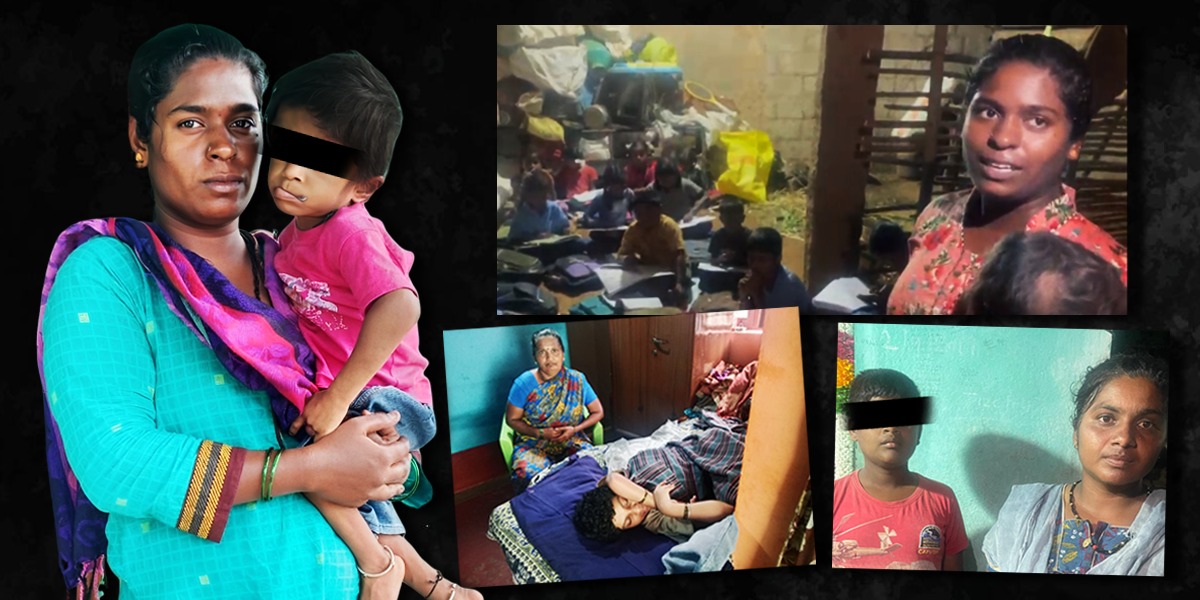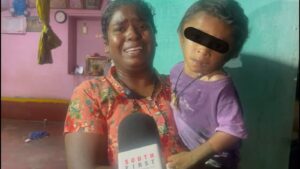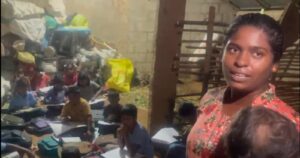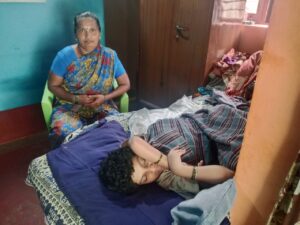Published Aug 20, 2024 | 11:00 AM ⚊ Updated Aug 22, 2024 | 9:36 AM

Children with cerebral palsy evokes sympathy, though they need empathy more. But their parents' plights are seldom seem.
The shadows on the light green wall of the modest, dimly-lit house looked menacingly slow, like puppets that had escaped a puppeteer’s strings. The puppeteer, Ramya, looked tired, holding a child close to her bosom as if clinging to her last hope.
Yet, the mother wished for his death — not once, but many times — and became a photograph among the inescapable shadows that took different shapes on the wall. At Halehalli gram panchayat in Karnataka’s Chikkaballapura, the four-year-old child looked too thin for his age and remained motionless on his mother’s shoulder.
Ramya has lost control over her life and is drifting anywhere the faintest hope would take her like the old man’s beard in the breeze.

Ramya in tears speaking to South First explaining the family’s doomed state due to her four year old son’s diagnosis of Cerebral Palsy.
The stranger’s voice might have made the boy curious. He lifted his head off Ramya’s shoulder and looked around to face this correspondent. He had his right arm thrown over her mother, and his head slanted over his left shoulder even as the look in his eyes became furtive. He seemed to be looking away, albeit unknowingly, from the reality right in front of him.
The boy’s T-shirt — its violet representing energies and mindfulness — looked darker as the constant stream of frothing drool drenched it. He kept making a noise that sounded like a faint grunt from a deep cave. The sound kept punctuating his mother’s conversation with South First.
Tears rolled down Ramya’s cheeks as she choked on her words: “I wish he had died instead of my daughter,” she held the boy tighter to her. The boy’s head kept jerking.
Meeting the constant demands of a child with cerebral palsy has taken a toll on the young mother. Her arms and shoulders ached, a peaceful meal and sleep had become distant dreams for her. The burden of an uncertain future in poverty and a loan of ₹8 lakh availed for the boy’s treatment further bogged her down.
“We put our everyday earnings into several chit funds with local people, and take money from there. We used it all for his treatment. Now, we’re left with nothing—not even a single rupee, not even hope,” she said.

Ramya teaching children of her village
Ramya felt darkness all around. “Each day for the past six months has been a nightmare. We’re completely shattered. We feel as if we’re fighting a losing battle just to make it to the next day. I don’t know how long we can keep going,” her voice cracked.
Benefits from the government have not touched Ramya’s family, despite being eligible for financial aid and healthcare support. Several families having children with cerebral palsy in the Chikkaballapura district have been moving from one government office to another, trying to access the benefits they desperately need.
The financial burden on families with cerebral palsy-affected children is staggering. Over the past four years, Ramya and her husband have spent over ₹8 lakh on medical expenses—money they didn’t have — plunging them deeper into debt. Her husband, an auto-rickshaw driver, earns a meager ₹150 a day, a sum that barely covers their basic needs, let alone the mounting costs of their son’s treatment.
Every evening, around 15 children from the neighbourhood crowd Ramya’s house, where she holds a tuition class with her son cradled in her arms. However, it does not help the family much.
“I don’t know how many of them pay the tuition fee (₹100/month) regularly. In this village, all of us have some or the other problem. I understand their parents’ plight. I know education is important. English is important for communication. I manage to teach them whatever little I know,” she said.
More than the money, the children bring with them some hope and positivity that help Ramya fight the battle to stay afloat. “These children keep my worries away for at least two hours a day,” her words came through a smile.
Ramya had completed her II PUC from Bengaluru. She couldn’t study further as her family decided to marry off, hoping that at least she would escape poverty.
The newly-married couple had their first child in 2020. He was normal for a month, after which he was diagnosed with cerebral palsy. His limbs failed.
Ramya wondered what had gone wrong with her healthy son. He had a bout of fever on the second day after his birth at a government hospital. Doctors later told the parents that the boy, now named Vishwak, would not have a normal life.
“There are moments,” she admitted, “I find myself waiting for his death. It’s a thought that tears me apart, but the truth is, I can’t stand to see him suffer like this anymore. Every day is a painful reminder of how helpless we are. I feel like I’m watching him slowly wither away, and I don’t know how much more either of us can take. I love him more than anything, but sometimes I think maybe his suffering would finally end if he is gone,” she whispered.
Vishwak’s diagnosis was not the only shock. Ramya lost her second child, a daughter born extremely healthy, weighing 3.5kg.
“She was so beautiful and healthy. Just a month and a half after her birth, she started getting continuous fever and developed fits. God just decided to snatch her away from me,” the mother said.
Ramya went into depression, not knowing the purpose of her life. However, she managed to pull herself up as she was left with no option but to fend for her family.
The mother carries Vishwak all the time until her husband returns home and takes care of the child for a while. Still, Ramya gets little time to rest, since she has to prepare the meals.
Ramya’s helplessness is also, in part, the tale of a bureaucratic tangle where lives lose identities and become ‘non-existent’.
Kiran B Nayak, a transman with disability from Chikkaballapura, explained it further. He along with 13 other physically-challenged people, including one Krishnappa from Ramya’s village, started an organisation, the Karnataka Vikavalachetanara Sangatne (KVS).
The organisation fights to help families like that of Ramya’s against the state government, health department, and the department for the empowerment of differently abled and senior citizens that seems to have turned a blind eye to the troubles faced by such parents.
Krishnappa explained that despite their efforts, every government office they visit turns them away, demanding an Aadhaar card for such children—a requirement that has become a cruel irony.
Vishwak’s application for the card, a gateway to vital assistance, was rejected three times. The rejection denied his family the essential financial support and healthcare benefits. Even for Vishwak to get his monthly disability pension they have to wait until he turns five. There are no free check-ups in hospitals too, which Ramya says is due to lack of an Aadhaar card.
“Vishwak’s application got rejected three times. It is difficult for a child with cerebral palsy to sit still or even get the fingerprints recorded properly. It was only after that fourth attempt that it has come through recently,” he said
Ramya said Vishwak was treated at a private hospital in Bengaluru’s Shivajinagar. “I used to take him to the Indira Gandhi Hospital in Bengaluru but never got a good response from the doctors. At the private hospital, my child is first examined and also given medications. But they are expensive. It costs around ₹15,000, including physiotherapy,” she explained why she avoided a government hospital.
The family exhausted all resources and was forced to stop Vishwak’s treatment in January. Incidentally, Vishwak’s family is not the only one stuck in the same predicament.
Nagendra Kumar and Vishwak are from the same village, but they do not each other. Both are victims of cerebral palsy.
Nagendra’s case is slightly better since he can now walk after undergoing surgery on his legs. However, Nagendra’s walking has brought his family down on their knees, since the surgery has left them deep in debt.
Kavitha, Nagendra’s mother, said they received no aid from the government. The family raised the required funds by borrowing from private chit-operators in the village. The boy’s surgery was also done at a private hospital, Rangadorai, in Bengaluru. Kavitha said the government hospitals they visited were unwilling to conduct the surgery.
Incidentally, the Karnataka government’s corrective surgery scheme for patients with disabilities provides financial assistance of up to ₹1 lakh. The amount will be released to the hospital concerned upon submitting the required documents.
Additionally, the Niramaya scheme provides ₹250 as insurance premiums for individuals with brain impairments, cerebral palsy, autism, or multiple disabilities.
Kavitha could not avail of any of these, mostly due to a lack of information. She claimed there were too many middlemen. She had shelled out ₹5 lakh for Pavan’s surgery.
Jayamma is a physiotherapist and member of KVS. She visits nine panchayats in three taluks–Bagepalli, Gowribidnoor, and Chintamani in Chikkaballapura district, providing physiotherapy to children with cerebral palsy.
“There are 50 children with cerebral palsy in just nine panchayats of three taluks. Imagine how many more children might be in the entire district,” she told South First.
“Words are too little to describe the plight of the parents. We from the KVS feel extremely helpless. How much can we do? These parents don’t even have time to bathe their children. Some of them are in debt. Many of them have no option other than to just leave their kids on the bed at home and go to work,” she said.
The children, with no caretakers, remain in bed till their parents return. “The families cannot survive if they don’t work,” she added.
Jayamma narrated the case of a single mother with four children. “The mother’s plight is heart-wrenching. She has four daughters and the fourth one has cerebral palsy. Managing this child during her periods is the worst time the mother faces,” the physiotherapist said.

Kalpana is now moving from pillar to post to get her daughter’s UDID card corrected from her being diagnosed as mental retardation to cerebral palsy
Mamata’s 16-year-old daughter Kalpana has cerebral palsy. Unfortunately, she has been diagnosed as child with mental health issues in her Unique Disability Identity Card and hence Mamatha could not get the benefit of the Karnataka governments recently announced monthly disability pension given to caretakers of cerebral palsy patients.
“I have to take care of my family alone. I was happy when Chief Minister Siddaramaiah announced ₹1,000 to caretakers of children with cerebral palsy. I thought it would help meet her monthly medical expenses. I went to the center to apply for disability certificate and UDID (Unique Disability Identity) card. I don’t know what they had entered. The doctor, during the assessment, wrote as mentally challenged. It is a permanent card which means I can never be eligible for the scheme,” Kalpana told South First.
Meanwhile Jayamma says the state government must come up with medical camps atleast twice a month in these villages where parents can take their children with cerebral palsy to get some physiotherapy done and also get access to free medications, if any.
Jayamma said that the help from the government has been excluding many people like Mamatha and Ramya, leaving the families trapped in a bureaucratic maze. The support would have eased their burden.
Families told South First that the state government, either through ASHA or someone specifically from either the health department or the disability department, must support them in making the process simpler.
“How often can these families take the children to hospitals for assessments and then to ‘nada kacheri’ (offices, cyber shops to fill in forms), etc? Can’t the government simplify the process? None of these places work without exchanging money,” Nayak of the KVS said.
Ramya, Mamatha and Kavitha are representatives of countless women struggling in rural India, where government support remains a distant promise and the burden of caregiving rests with the mothers.
The Karnataka government recently launched a scheme for caregivers. Under this initiative, caregivers attending to patients suffering from cerebral palsy, muscular dystrophy, Parkinson’s, and multiple sclerosis will receive a monthly stipend of ₹1,000. Multi-Purpose Rehabilitation Workers (MRW) and Village Rehabilitation Workers (VRW) across the state are compiling a list of eligible caregivers. A total of ₹4 crore has been allocated for this incentive.
Though there is also a proposal to extend this scheme to caregivers of patients with spinal problems and mental retardation, it has not yet been included in the government order.
Patients under the care of these caregivers must possess a UDID card. There is no age or income ceiling for this benefit, but it is available only to those with 75 percent disability.
According to the volunteers and media reports many applications seeking this scheme are still pending, mostly due to the lack of UDID cards or confusion whether the patient has cerebral palsy or is mentally challenged. According to a media report, there are 140 pending applications for UDID cards in Mangaluru alone.
Darkness became thicker when this correspondent left Ramya’s house. The shadows on her walls suddenly seemed to have some meaning, and purpose. They represent the adversities that keep mothers like Ramya in perpetual darkness — until someone sparks a little hope for them to keep going.
(Edited by Majnu Babu).
(South First is now on WhatsApp and Telegram)

